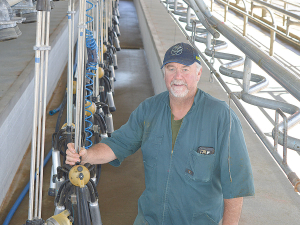Inflated on-farm costs and low milk payout seems to have become the new norm for farmers, says Waikato Federated Farmers dairy chair Matthew Zonderop.
He says since the middle of 2023, interest rates and farm input costs have soared and there’s little sign of any respite anytime soon.
Zonderop made the comments after DairyNZ released its Economic Survey for the season 2022-23 – the most expensive season in a decade.
The combination of reduced milk price and increased on-farm costs compared to the previous season saw the 2022-23 operating profit drop to $2.57/kgMS, down from $3.46/kgMS in 2021-22.
Zonderop says he’s not surprised with the survey results and adds that nothing changed in the 2023-24 season that ended May 31 this year.
“It doesn’t surprise me that 2022- 23 season was the most expensive in 10 years,” he told Rural News.
“I think a lower-than-average payout and higher farm input costs have become the norm for the dairy industry.”
Zonderop doesn’t expect the situation to change anytime soon, pointing to shipping disruptions on the Red Sea.
Tensions in the region have been escalating since November, when Yemen-based Houthis started launching drone and missile attacks against ships transiting the Red Sea. The attacks, meant to pressure Israel to stop its bombardment of Gaza, are leading to sustained delays and disruption in trade, along with surging shipping costs.
An increasing number of companies that transport vital raw materials and fuels have suspended operations in the area. They are rerouting their ships an additional 3500 nautical miles around the Cape of Good Hope in South Africa — the route the Suez Canal was built to circumvent in 1869.
Zonderop says this is leading to a price war in shipping containers and keeping prices of imported farm inputs high.
DairyNZ head of economics Mark Storey says operating expenses of both farm owner-operators and sharemilkers increased. For owner-operators, operating expenses jumped 5% in the 2022/23 season, up to $6.67/kgMS, which is the highest it has been in the last 10 seasons.
“A deeper dive into the operating expenses shows that feed continues to be the largest operating cost, making up around 30% of total farm expenses,” he says.
This was followed by labour (19%) and maintenance costs (18.7%) as the second and third highest expenses. Feed costs have been the largest operating cost on dairy farms since the 2007-08 season.
Sharemilkers also experienced an increase in operating expenses, to $3.76/kgMS. Compared to the 2021-22 season, there was also a reduced average milksolids payout, down to $4.14/ kgMS. Despite this tightened economic performance, on average, sharemilkers were able to maintain profitability and positive returns.
“Farmers have focused on making changes to manage these increased costs, and fluctuations in the milk price payout, to remain profitable,” says Storey.
“We also noted the ongoing shift in the make-up of costs farmers are facing, with a large increase in interest costs in 2022/23. In this context, it is encouraging to see that debt-toasset ratios marginally declined (down 3%), which is a positive indication that farmers did not take on more debt in that season.
Storey acknowledges that farms are still operating in a tight economic environment, and should remain focused on being considerate of their spending.



















